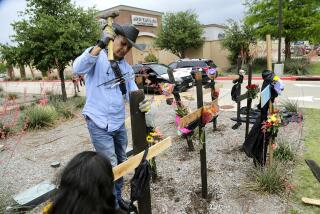Rioting in Istanbul and Ankara
- Share via
Asia
Turkey: More than a dozen people were killed in two days of sectarian rioting in Istanbul that later spread to Ankara, according to British and Turkish news reports. The riots began when members of the minority Alawite Muslim sect marched through the streets of Istanbul to protest an attack by gunmen on Alawite coffee shops in which two people were killed. Over a two-day period, the demonstrators swelled into the thousands, police attempted to contain them and fighting broke out. Two of the deaths occurred when a car exploded after being set aflame by a gasoline bomb. Curfews were imposed in three areas of Istanbul’s troubled Gazi district.
Japan: The U.S. Embassy in Tokyo advises that Aum Supreme Truth, the cult suspected of involvement in the poison gas attack on the Tokyo subway in March, considers Sept. 10-16, 1995, to be significant dates. A police crackdown and the arrests of several leading figures in the cult may have diluted the effectiveness of the group, but other members “may seize the opportunity to mark these dates in some manner, perhaps with an act of violence, crime or terror,” the embassy warns. It recommends that Americans in Tokyo “exercise common sense by taking prudent security precautions while walking or traveling around town.”
South America
Brazil: The army was called out for the second time in six months to crack down on Rio de Janeiro’s increasingly defiant outlaw population. But Times correspondent Ron Harris reports that drug traffickers and bandits are boldly challenging both the army and police and that a record 28 murders occurred in one day during the first week of Rio II, as the Army sweep is called. So far this year, two dozen police have been killed in Rio, where nearly 20 people are murdered daily. Further worsening the quality of life for residents and visitors, transport and public utilities strikes hit Brazil’s major cities late last month, shutting down subway systems in Rio, Sa~o Paulo, Belo Horizonte and Recife.
Europe
Spain: The general safety situation in Spain is good, according to the U.S. State Department, with violent crime less common than in some parts of the United States. However, travelers are cautioned to be alert for pickpockets, muggers and scam artists. In one common scam, the tires of a tourist’s rental car are punctured, a “good Samaritan”--who punctured the tires--first offers to help, then robs the victim of cash, credit cards and passport. The U.S. Embassy in Madrid has strongly encouraged car rental companies to give customers an embassy-prepared warning sheet, a policy which has substantially reduced such incidents. Spain’s nationwide phone number for reporting an emergency is 091.
Briefly . . .
Guatemala: The State Department advises against travel to Guatemala, where an American woman and her two children, ages 4 and 6, were kidnaped by gunmen as they arrived at a school in a town near Guatemala City. The abductors later demanded $20,000 in ransom, Reuters news service reports. The victims have not been released. With kidnapings of anyone who looks as if they have money on the rise, the Guatemalan Congress has approved the death penalty for the crime.
Jamaica: The murderer of a Florida tourist was sentenced to death by hanging, according to Reuters. The victim, Norris Rayam, and his wife were staying at a villa in the North Shore resort of Ocho Rios in June, 1994, when the murder occurred during a break-in.
Poland: The bomb has become the weapon of choice for the Polish underworld, Reuters reports--used to settle scores, frighten opponents or fight for turf. Bombings in Warsaw have risen from 37 in 1992 to 82 last year, and eight people have been killed and 36 wounded in the last two years.
Hot Spots: Because of renewed Serb-Croat fighting, the State Department has added Croatia to its list of places where Americans are advised not to travel. Also on the list are Afghanistan, Algeria, Angola, Bosnia-Herzegovina, Burundi, Colombia, Guatemala, Iran, Iraq, Lebanon, Liberia, Libya, North Korea, Peru, Rwanda, Serbia and Montenegro, Sierra Leone, Somalia, Sudan and Tajikistan.
The U.S. State Department offers recorded travel warnings and advisories at (202) 647-5225; the fax line is (202) 647-3000.
More to Read
Sign up for Essential California
The most important California stories and recommendations in your inbox every morning.
You may occasionally receive promotional content from the Los Angeles Times.













